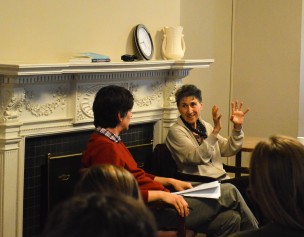
The University’s Social, Cultural, and Critical Theory Certificate invited students and faculty to join in a public conversation with Silvia Federici, a feminist scholar, teacher, and activist, on Thursday, Sept. 24. The event took place in the Vanguard Lounge of the Center for African American Studies.
Assistant Professor of American Studies and English Matthew Garrett, Director of the Certificate, sought out Federici with the intent of expanding students’ understanding of theory as it connects to other aspects of social life and politics.
“I wanted to bring in scholars, theoreticians, or activists who could speak to the issues that we deal with in the certificate in a broad way, but also convey ways of being politically engaged,” Garrett said.
Though Garrett originally proposed the event as a lecture, Federici expressed a strong desire to engage in some way with the audience. In response, the event was publicized as a “public discussion.”
Founding Director of the Social, Cultural, and Critical Theory Certificate and Associate Professor of Sociology Jonathan Cutler says that he finds a place for Federici’s work in his courses whenever possible. In an email to The Argus, Cutler stated that he sees Federici as an influential figure for University students who can speak to issues that are affecting their lives.
“Federici does as much as anyone I know to stay relevant, always offering up a combination of historical and real-time analysis of various battles for leverage in every imaginable global context,” Cutler said. “…She works with the newspaper in her right hand and social theory in her left—and in Federici’s case, I think it’s fair to say that the left keeps very close tabs on the right.”
Garrett described Federici as unique in her ability to both develop powerful and comprehensive theory—specifically regarding the situation of women in capitalist modernity—and continuing to work as an activist.
“[Her work is] that nexus or connection between the theory and the practice,” Garrett said.
Federici captivated the audience with her memories of growing up during an immediate post-war period that she quickly learned was dominated by political injustice.
She discussed her college experience at the University at Buffalo, where she became heavily involved with the feminist movement.
“Through the feminist movement, I was able to bring together the personal and political in a way I could not do before,” Federici said.
She considers her move from Italy to the United States and then to Africa to be very important in shaping her current understanding of capitalism and the global community. She encouraged the audience to approach societal issues from many different perspectives.
Ellie Martin ’16 found Federici’s advice particularly captivating.
“The theme of externalizing your own experience and externalizing yourself to gain a better understanding of your internal life and what’s actually going on where you live is something I am very interested in,” Martin said. “I am planning on exploring…through travel and experiences outside of where I live.”
At the conclusion of the lecture, Federici gave an in-depth explanation of her most recent work, “Caliban and the Witch,” which deals with the history of capitalist development in relation to women. She encouraged the audience to explore this issue further, emphasizing the fact that witch-hunting is very much alive around the world. In an email to The Argus, Cutler singled out this book in particular.
“As always, Federici’s analysis relies on a consistently powerful method of research that discerns the history of popular power in meticulously maintained archives of elite fear,” Cutler wrote. “I hope students and faculty alike will find in Federici a provocative and inspiring model for reading history against the grain.”
Alexandra Stovicek ’17 cited her feminist beliefs as her main motivation for attending the event.
“I’m really interested in [Federici’s essay] “Wages [Against] Housework,” which we read in [Associate Professor of American Studies and Anthropology] Margot Weiss’ ‘Sex, Money and Power’ class this semester,” Stovicek said. “Although Silvia Federici didn’t really touch on that very much, she mentioned a lot of the larger thematic elements of oppression and exploitation that led to her work and to other works about force of capitalism and patriarchy.”
In the final moments of the conversation, Federici emphasized the problematic nature of “selective change.”
“Something I’ve learned in my life is that no matter what gains you think you’ve made, unless you are continuously engaged in the struggle and try to change the world in a way that is just for all–not only for yourself, but for all–you’re going to lose those gains,” Federici said.


Leave a Reply